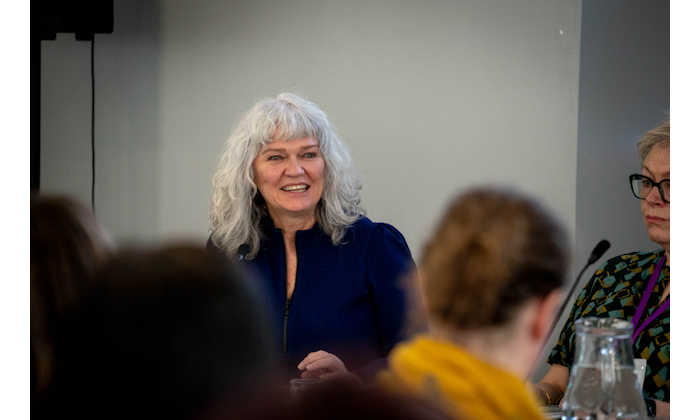Research Communications Conference 2024
18 Mar 2024
Developing the skills you need to reach new audiences - browse our conference tools and resources

Academics from across the University joined research comms professionals to hear about how they could more effectively communicate their research.
The full-day Research Communications Conference began with a panel discussion on the overarching theme chaired by Professor Colette Fagan, Vice-President for Research. She was joined by Professor of Nursing Dame Nicky Cullum, Duncan Shaw, Professor of Operational Research and Critical Systems, Dr Marco Domingos, a Senior Lecturer at the Royce Institute, and Research Communications Manager Joanne D’Angelo.
Professor Fagan said academics needed to make an impact and reach wider audiences with their research. “That’s important for us as a university and it’s good for careers too. Academics need to think about their personal profile, their web presence, and really distilling their key messages.”
Partnership
Professor Shaw stressed the importance of working in partnership. “You need communications to get the message out as soon as a project starts, don’t wait until the end. Give interim findings through blogs, attend webinars, ask comms professionals what has wider appeal and start a conversation. In short, create a buzz around your research.”
Professor Cullum added: “Be clear on the message you want to convey and, importantly, on who wants to hear it. Think hard about who is the recipient of your message and making that messaging concise.”
Dr Domingos said: “As researchers we don’t know how to communicate sometimes and for me it’s really been a learning process. By engaging with communications it allows me to reach audiences I would not traditionally engage with. Don’t be afraid, be open-minded.”
Joanne D’Angelo stressed the importance of creating an elevator pitch at the beginning of the process. “Putting together such a pitch is really important in terms of being able to spell out very clearly the key messages of your research to an external audience right from the start.”
Social media
Presenters Lucy Occleston and Ruby Lowe urged researchers not to be afraid to engage with social media. Instead build and nurture a social media presence – but across the channels that work best for their audience. They discussed the benefits of YouTube and LinkedIn for long-form content, while TikTok and Instagram continue to gather popularity too.
Media relations
News and Media Relations Manager Ben Robinson stressed the importance of communicating research well before it’s published: “We can then work with the academic on constructing an effective narrative, which can be pitched to both local and national media.”
The point was echoed by Paul Keaveny, Editor of the Conversation, who explained the ways academics can engage with the platform, from short analysis articles on new research to lengthier insight pieces.
The conference also featured breakout sessions on creating a research communications plan, the dos and don’ts of a personal website, how to achieve impact with policymakers, and how to update Pure profiles. There were also lightning talks on video tools, open research, developing a podcast and creating the ideal campaign pitch. The Policy@Manchester team led a workshop on how to achieve impact with policymakers.
Further support
You can see all the presentations at:
There are Research and Innovation slides you can download for your presentations – go to the right-hand box on the top row at:
And there’s more support at:
